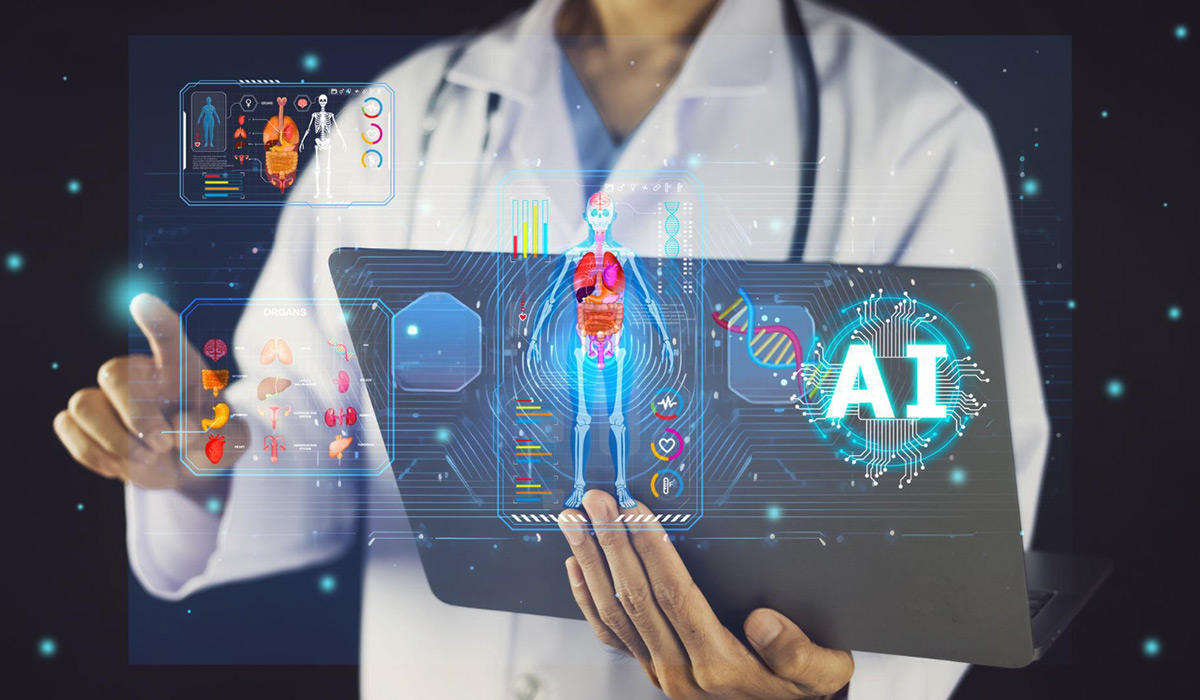The healthcare industry undergoes rapid transformation through Artificial Intelligence as this modern technology practices essential changes to medical service operations and management. According to the reports, the global AI in healthcare industry market began 2023 with USD 19.27 billion in value. Yet, experts forecast it to maintain a 38.5% compound annual growth rate (CAGR) between 2024 and 2030 and reach USD 187.7 billion by 2030. Healthcare institutions currently face an increase in their adoption of AI technologies while simultaneously working to develop new healthcare applications through these emerging solutions.
Healthcare institutions are implementing AI technologies at an expanding rate through their operations. IBM and Microsoft collaborated with IDC for a March 2024 study, which revealed that 79% of healthcare industry institutions had implemented AI systems and obtained USD 3.20 in profit from each USD 1 spent while achieving a return on investment in 14 months. Medical institutions quickly incorporate AI-driven solutions Services because they firmly trust these systems to overcome complex problems while lowering operational costs.
What is AI?
Artificial Intelligence operates as the capability of machines to imitate human cognitive abilities, especially within computer systems. AML processes three functionalities, which include learning how to acquire information and rules and apply them to generate conclusions and perform self-correcting activities. AI in healthcare integrates different technological elements, such as machine learning, natural language processing, and robotics, to process complex medical data for better clinical management decisions.
AI-Driven Solution Development in Healthcare
Medical Imaging and Diagnostics:
The development of artificial intelligence solutions in medical imaging and diagnostics leads to earlier detection of diseases, including cancer, for patients. Medical imaging AI technologies perform precise examinations of images that investigators in radiology may miss during their assessments.
The recent budgetary reduction of AI cancer technology in England has led experts to predict higher mortality rates from delayed radiotherapy treatment. Numerous accurate diagnoses become quicker through AI diagnostic equipment, which results in better healthcare industry for patients.
Drug Discovery and Development:
Premature drug discovery advances through AI-based solutions enable businesses to speed up new medicine development procedures at reduced development costs. Artificial intelligence algorithms go through extensive data to forecast medicine interactions and then recognize possible assets for trial stages.
The pharmaceutical companies Johnson & Johnson and Merck have introduced employee training with AI because they understand AI technology will transform multiple areas within drug development. The application of AI reduces research durations because it delivers rescue medication treatments to patients more quickly.
Predictive Analytics and Disease Prevention:
Predictive analytics, together with disease prevention functions, become more straightforward due to AI-based software solutions that enable healthcare providers to identify and stop diseases at their early stages. AI models review electronic health records (EHRs), and additional patient data through which they detect individuals at high risk so early intervention becomes possible.
Healthcare organizations apply predictive analytics models for patient admissions forecasting, which helps them better manage resources and decrease pressure in the healthcare system. Artificial intelligence-powered solution development in this field enhances operational efficiency while delivering superior health benefits to patients.
AI-Driven Solutions Services Enhancing Patient Care
AI-Powered Virtual Assistants:
Virtual assistants that utilize AI-powered services now improve healthcare delivery by both performing repetitive tasks and freeing healthcare staff from administrative burdens. AI-powered medical assistants enabled through artificial intelligence technology would allow patients to arrange appointments as well as reply to medical questions while also providing them with prescription reminders. By allowing digital assistant access, medical staff achieve better patient care while delivering higher quality healthcare experiences.
Medical Note-Taking and Documentation:
Investments in AI medical note-taking applications increased from $390 million in 2023 to $800 million in 2024 because healthcare providers require technologies that enhance clinical documentation processes. Medical AI tools automatically create time-sensitive records and summaries from patient meetings without requiring manual patient documentation. Medical service providers use automation systems in their processes to free up staff time for patient engagement, which enables them to maintain complete and error-free medical documentation.
Robotic Surgery and Rehabilitation:
AI-based solution development enables healthcare staff to create improved precision robotic systems that minimize surgical impact on patients. Through AI-powered robotic systems, physicians receive help with advanced medical procedures, thereby delivering greater accuracy with reduced patient healing durations. The integration of AI technology through wearable devices provides patients with continuous feedback regarding their recovery status and customizes their therapy plan, which enhances treatment results.
AI in Mental Health Support:
Virtual therapy and mental health assessment are two AI-based solutions that assist mental health patients through AI-driven services. People can get cognitive behavioral therapy (CBT) techniques through AI-powered chatbots and applications, and these systems can track their mood shifts and deliver emergency assistance functions. The services enhance accessibility by bringing mental healthcare services closer to diverse audience groups.
The Future of AI in Healthcare
The evolution of AI-driven solution development shapes healthcare into a more innovative system that places patients at its centre. Doctors expect AI-driven solutions services to develop more advanced integration capabilities with wearable technology to provide real-time health monitoring combined with early disease detection capabilities. The integration between generative science and individualized healthcare, along with medical remote services, will optimize client care and maintain accessible, high-quality healthcare services.
AI healthcare applications require proper management of data protection issues, together with ethical evaluation and regulatory requirements for achieving broad healthcare sector integration. AI-driven solutions achieve industrial transformation in healthcare through ethical technology management, which generates better medical results and operational efficiency.
Conclusion
AI plays a profound role in healthcare, which extends beyond transformation to create a complete restoration of the healthcare industry. AI-driven solution development alongside AI-driven solutions services will create an improved healthcare environment through technological collaborations with expert human practitioners.
